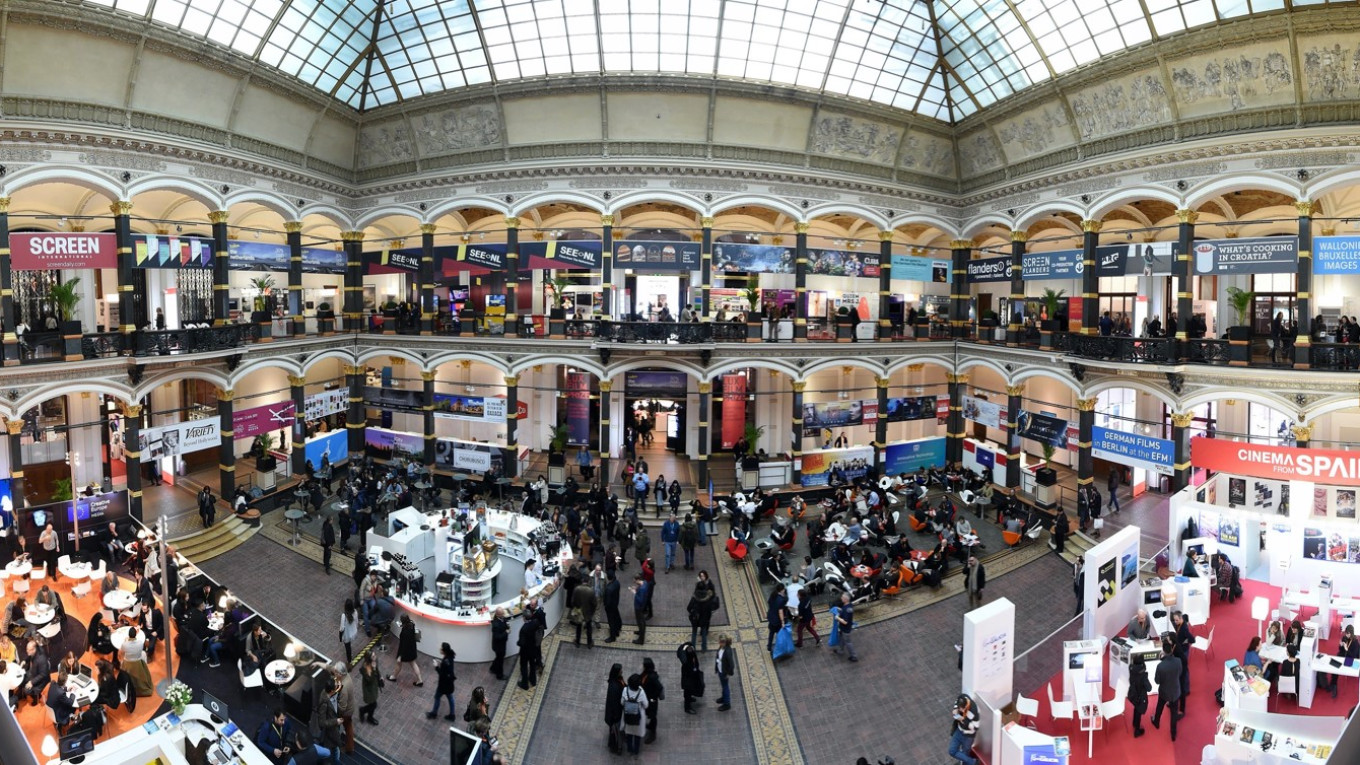Foreign films have always been the backbone of the film distribution industry in modern Russia. According to the Russian Cinema Fund, foreign films made up almost 75 percent of all ticket sales in 2021.
In March 2022, the situation changed dramatically, especially after Hollywood studios left the Russian market. But the latest edition of the Berlin Film Festival (“Berlinale”) showed that the domestic film industry is far from being in decline.
Many foreign companies, including some of the major North American studios that had previously refused to do business with Russian distributors, have resumed making deals. This information is also confirmed by the Russian Film Fund, which reports that more than 140 American films were released on Russian screens in 2022. By September of last year, Western movies, especially indie films, had already begun to outstrip domestic cinema again.
The Berlin film festival has been a strong supporter of Ukraine, even adopting the yellow-and-blue color of the Ukrainian flag for its badges and posters. Last year it announced that it would not welcome the official Russian delegation, which supports the Kremlin’s policies. This ban, however, did not apply to independent companies. This year the non-state Central Partnership, which distributes and produces films and is also part of the Gazprom-Media holding company, attended the film market along with other independent filmmakers.

Boycott? What boycott?
Several German sales agents who had previously worked with Russia said their business with Russian partners remained the same; since they had a “relationship of trust” that had developed over decades, they decided not to make changes.
French companies also planned to continue supplying content to the Russian market. Unifrance director of cinema, Gilles Renouard, said that Russian viewers are among the most active consumers of films from France and that French filmmakers believe in the importance of cultural exchange with Russia. According to Unifrance, 87 French films were released in Russia in 2022, including “Brother and Sister,” “The New Toy,” “The Testing,” “Arthur: Malediction,” and “Waiting for Bojangles.”
Major British and Russian movies were also released in Russia this past year. For example, Guy Ritchie's spy comedy "Operation Fortune: Ruse de Guerre," the action movie "Plane," and "Shotgun Wedding" are now in the top ten box office films in Russia.
“Russian distributors seemed to be the most active at the European Film Market in Berlin,” Daniil Goroshko, arthouse distributor, Head of Acquisitions and CEO of A-One Films, told The Moscow Times. Goroshko’s company released Ruben Östlund’s Cannes Palme d’Or-winning “Triangle of Sadness” in Russian cinemas in December.
Some contracts were signed a long time ago, and distributors have been fulfilling their obligations. In other cases companies officially announced their withdrawal from the Russian market, and their representatives do not officially cooperate with Russian organizations. But they sell their films to third-party distributors, and the films eventually end up on Russian screens. In addition, many leading Russian distribution companies have opened branches in other countries to easily handle international payments for foreign contracts. Despite the many sanctions imposed by the U.S. and Europe against Russian state-owned companies, there are no laws prohibiting Western companies from doing business with Russian entities that are not included on the sanctions list.
“We didn’t release a single film from February to December last year,“ Daniil Goroshko said. “We thought a lot about what would be right in the current situation and what our work principles should be. This time we bought only two films to Berlin.”
In general, Goroshko continued, they were pleased with the festival. “There are no major Hollywood studios on the Russian market that can grab up the whole audience. And although there are fewer movie theaters, independent cinema continues to attract a lot of viewers, especially if these films are being talked about. So I wouldn’t say that Russian indie distributors have experienced any major changes.”
Goroshko did note some differences. In the past, he said, the company bought films and distributed throughout the former U.S.S.R., but now his company does not distribute in Ukraine. And the second change could be observed after the New Year. “Until recently, many film venues in Russia were skeptical about showing domestic films. But since January, cinemas have begun to fill their programs with these films as much as possible.”
And these films have been popular. “Cheburashka” (a mysterious animal that was an iconic Russian cartoon character in the 1970s) is the leader in Russian film distribution at the moment. From the beginning of the new year until the end of February, it generated more than 70% of the domestic box office, approaching 3 billion rubles. Prior to that, “Land of Legends” — an adaptation of the historical novel "Heart of Parma" that is based on the events of the 15th century when the Great Perm was conquered by Moscow – was leading at the domestic box office, setting several records at once. Not only was it watched by more than 3 million viewers in the first weeks, it led in the local box office for eight weeks. Before the "Land of Legends," only "Avatar" had hit the eight-week mark.

Breaking away
One of the important events at Film Festival was the inauguration of the Belarusian Independent Film Academy. It was launched by Olga Chaikovskaya, founder of the Northern Lights Minsk Film Festival; directors Daria Zhuk, Andrei Kutilo and Aleksey Poluyan; former program director of the Listapad Minsk festival Igor Sukmanov; and film critic Irena Kotelovich.
This new Academy was formed to represent Belorussian filmmakers, most of whom were forced to emigrate and are not part of official film organizations in Belarus.
European filmmakers welcomed the new film academy with open arms. The Berlin Film Festival provided the venue, and the event was attended by the German State Minister for Culture and Media, Claudia Roth. With the new association, there is hope that at least in a few years the first independent films from Belarusian directors will appear on screens.
Many Russian filmmakers also left their homeland but don’t yet have an umbrella organization. However, when world film festivals refuse to show Russian films made with state support but interest in stories from Russia is still high, it may be just a matter of time before a similar organization will be founded by Russian filmmakers, too.
A Message from The Moscow Times:
Dear readers,
We are facing unprecedented challenges. Russia's Prosecutor General's Office has designated The Moscow Times as an "undesirable" organization, criminalizing our work and putting our staff at risk of prosecution. This follows our earlier unjust labeling as a "foreign agent."
These actions are direct attempts to silence independent journalism in Russia. The authorities claim our work "discredits the decisions of the Russian leadership." We see things differently: we strive to provide accurate, unbiased reporting on Russia.
We, the journalists of The Moscow Times, refuse to be silenced. But to continue our work, we need your help.
Your support, no matter how small, makes a world of difference. If you can, please support us monthly starting from just $2. It's quick to set up, and every contribution makes a significant impact.
By supporting The Moscow Times, you're defending open, independent journalism in the face of repression. Thank you for standing with us.
Remind me later.






